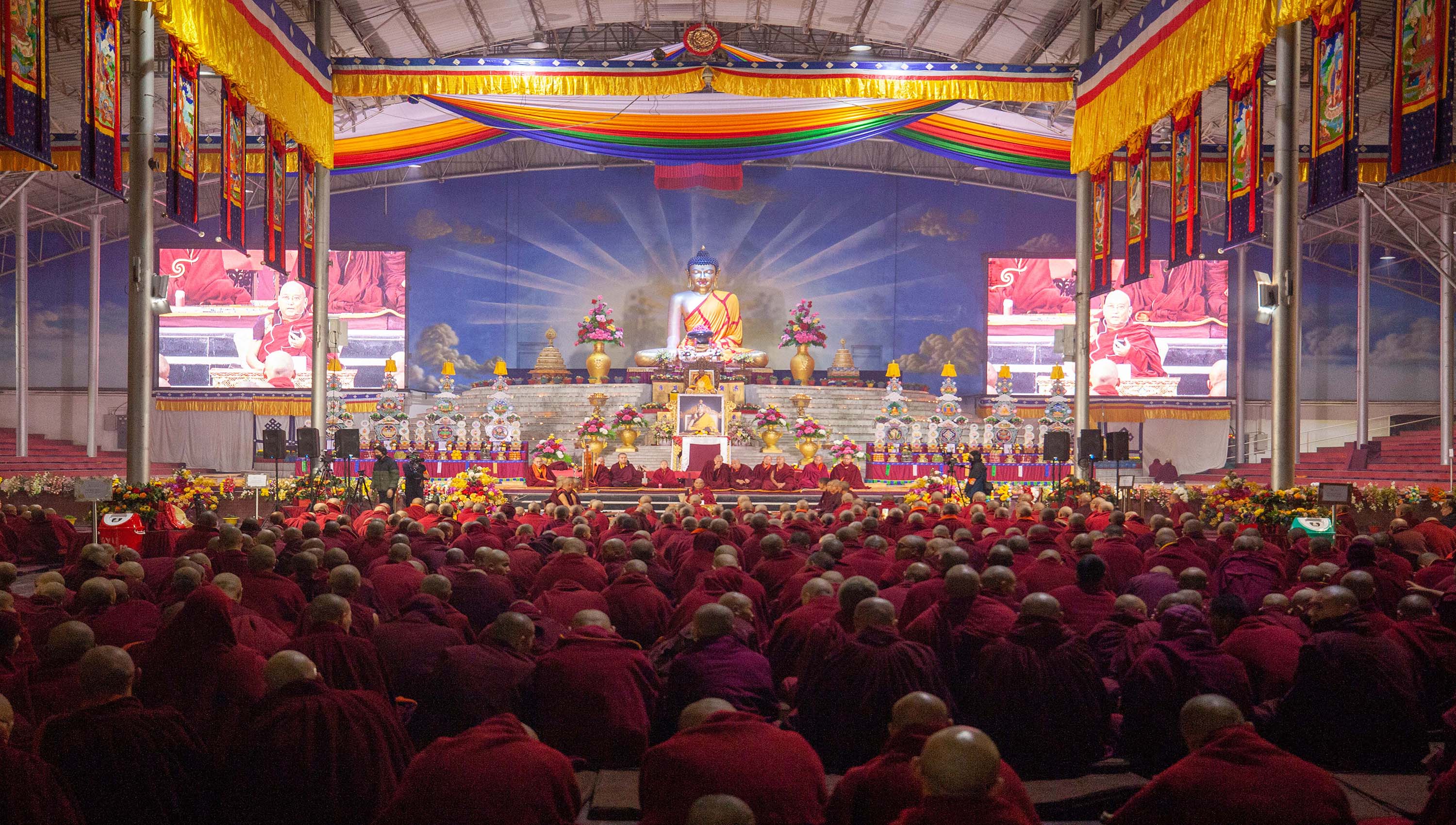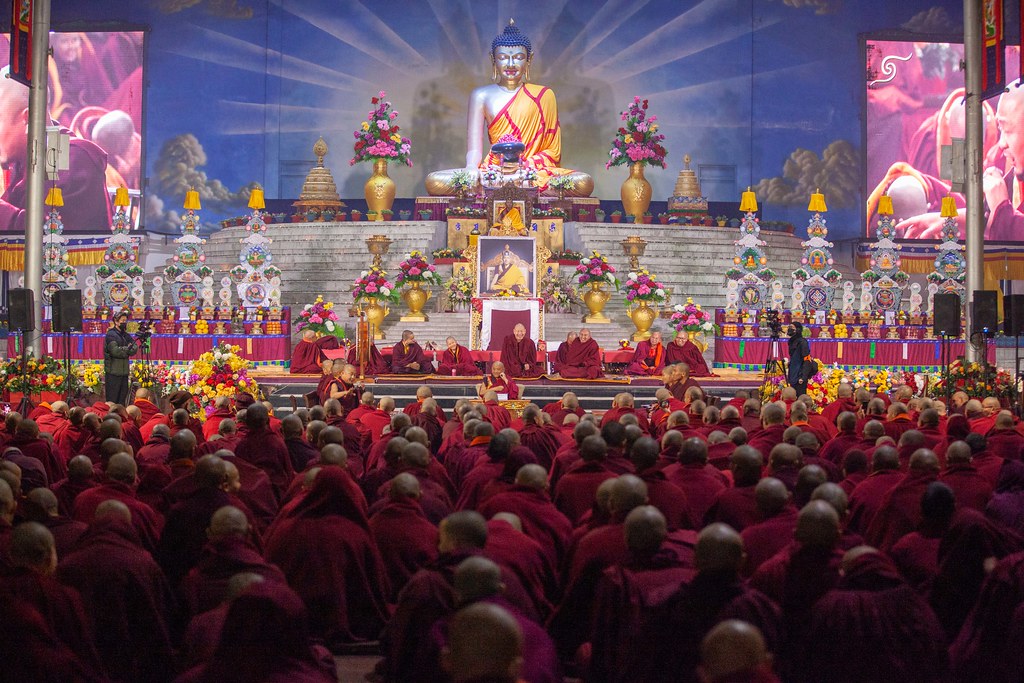Monlam Pavillion
22 January 2024
This was the second session which is part of the Karma Gunchoe programme, initiated by the 17th Gyalwang Karmapa, whose aim was to widen the educational experience of the monks and improve their ability in public speaking.
One monk from each of the ten Gunchoe shedras participated, and the monks were divided into two teams. The first team supported the motion that work is more important than study and meditation, and the second team contested it.
The adjudicator was Geshe Jamyang from Lava Shedra in Nepal.
He opened the session with an explanation of the difference between a discussion and a debate. Discussion, he said, could include questions and answers from the audience, but in debate one team holds the argument and strives to prove it. The other team opposes the argument and posits evidence to defeat it. There’s no opportunity for the audience to ask questions.
In line with the Karmapa’s intentions, he advised that participants should aim to speak clearly, make clear points, and make them comprehensible, so that everyone in the audience could understand. This was based on the Tibetan principle: the sound of the words ie pronunciation should be correct; the word itself should be the correct one; the meaning should be clear.
In the first round, one person from each team had ten minutes to speak to the topic.
In the second round, each participant had three minutes to make their points in response to what had been said.
In the third round, time was reduced to one minute per participant.
Finally, one person from each team had five minutes to sum up and conclude the arguments.
The debate was very lively, and the audience was extremely enthusiastic. They really enjoyed the arguments put forward. There was a lot of laughter, shouts of encouragement, and clapping.
To give some idea of the debate, here is a summary of the opening arguments from each side.
Team One began.
There are three spheres of activity –the first is reading, hearing and contemplating; the second is concentration or meditation; the third is action - work or activity.
The sphere of action is very important, because it helps the Buddha’s teachings to flourish. Examples would be building a monastery or serving members of the sangha who practise the Buddha’s teaching. Both of these allow the Dharma to flourish.
A further illustration of the point comes from the life of the 16th Karmapa. When he came to India in 1959, in order to preserve the Buddha’s teachings, he had to build a monastery. With this vision he asked permission of the Chogyal of Sikkim and President Nehru of India. Then he built the monastery, and that action from then until today, has made it possible for the first and second spheres—study and meditation—— to flourish. Moreover, this was a beginning. He was the first to build a monastery, others followed suit, and lots of monasteries have been built.
It's like a relationship of cause and effect. A Tibetan Buddhist proverb says:
“The foolish man goes after the result, but the wise man goes after the cause.”
If the doctor studies everything about medicine and treatments but doesn’t treat people, everything is in vain. His studies are only of value if he brings benefits to his patients. Therefore, it’s only the third sphere of action that brings benefit to others.
Team Two responded.
They argued that the sphere of work is not more important in reality, and gave four counter-arguments to support their view:
We can know from the life of Buddha that he only ever mentioned the importance of the first two.
There’s no proof or logic for the argument that action is more important found in the Buddha’s teachings. Those defending the view were unable to provide quotations.
If you say that it is important compared to other things, it makes no sense. If you say that this table is bigger compared to that one, it doesn’t it a big table. It’s all relative. As it says in Nagarjuna’s Mūlamadhyamakakārikā
“There is no phenomenon which is not interdependent”
Another quote from Nagarjuna, from his Praise to Dharmadhatu reads
“If there is no single phenomenon which arises interdependently or ceases to exist interdependently, how are the ignorant going to have conceptual thought?”
Finally, the argument is misleading. If, in the assembly of sangha members you say that reading, studying and meditating are less important, you are deceiving young monks. There is the possibility of giving them the wrong message, thus incurring a fault. For this reason, the sphere of work is not more important.
And so the debate continued.
You can watch the debate on Kagyu Gunchoe FB, unfortunately there’s no English translation.
22 January 2024
This was the second session which is part of the Karma Gunchoe programme, initiated by the 17th Gyalwang Karmapa, whose aim was to widen the educational experience of the monks and improve their ability in public speaking.
One monk from each of the ten Gunchoe shedras participated, and the monks were divided into two teams. The first team supported the motion that work is more important than study and meditation, and the second team contested it.
The adjudicator was Geshe Jamyang from Lava Shedra in Nepal.
He opened the session with an explanation of the difference between a discussion and a debate. Discussion, he said, could include questions and answers from the audience, but in debate one team holds the argument and strives to prove it. The other team opposes the argument and posits evidence to defeat it. There’s no opportunity for the audience to ask questions.
In line with the Karmapa’s intentions, he advised that participants should aim to speak clearly, make clear points, and make them comprehensible, so that everyone in the audience could understand. This was based on the Tibetan principle: the sound of the words ie pronunciation should be correct; the word itself should be the correct one; the meaning should be clear.
In the first round, one person from each team had ten minutes to speak to the topic.
In the second round, each participant had three minutes to make their points in response to what had been said.
In the third round, time was reduced to one minute per participant.
Finally, one person from each team had five minutes to sum up and conclude the arguments.
The debate was very lively, and the audience was extremely enthusiastic. They really enjoyed the arguments put forward. There was a lot of laughter, shouts of encouragement, and clapping.
To give some idea of the debate, here is a summary of the opening arguments from each side.
Team One began.
There are three spheres of activity –the first is reading, hearing and contemplating; the second is concentration or meditation; the third is action - work or activity.
The sphere of action is very important, because it helps the Buddha’s teachings to flourish. Examples would be building a monastery or serving members of the sangha who practise the Buddha’s teaching. Both of these allow the Dharma to flourish.
A further illustration of the point comes from the life of the 16th Karmapa. When he came to India in 1959, in order to preserve the Buddha’s teachings, he had to build a monastery. With this vision he asked permission of the Chogyal of Sikkim and President Nehru of India. Then he built the monastery, and that action from then until today, has made it possible for the first and second spheres—study and meditation—— to flourish. Moreover, this was a beginning. He was the first to build a monastery, others followed suit, and lots of monasteries have been built.
It's like a relationship of cause and effect. A Tibetan Buddhist proverb says:
“The foolish man goes after the result, but the wise man goes after the cause.”
If the doctor studies everything about medicine and treatments but doesn’t treat people, everything is in vain. His studies are only of value if he brings benefits to his patients. Therefore, it’s only the third sphere of action that brings benefit to others.
Team Two responded.
They argued that the sphere of work is not more important in reality, and gave four counter-arguments to support their view:
We can know from the life of Buddha that he only ever mentioned the importance of the first two.
There’s no proof or logic for the argument that action is more important found in the Buddha’s teachings. Those defending the view were unable to provide quotations.
If you say that it is important compared to other things, it makes no sense. If you say that this table is bigger compared to that one, it doesn’t it a big table. It’s all relative. As it says in Nagarjuna’s Mūlamadhyamakakārikā
“There is no phenomenon which is not interdependent”
Another quote from Nagarjuna, from his Praise to Dharmadhatu reads
“If there is no single phenomenon which arises interdependently or ceases to exist interdependently, how are the ignorant going to have conceptual thought?”
Finally, the argument is misleading. If, in the assembly of sangha members you say that reading, studying and meditating are less important, you are deceiving young monks. There is the possibility of giving them the wrong message, thus incurring a fault. For this reason, the sphere of work is not more important.
And so the debate continued.
You can watch the debate on Kagyu Gunchoe FB, unfortunately there’s no English translation.



































